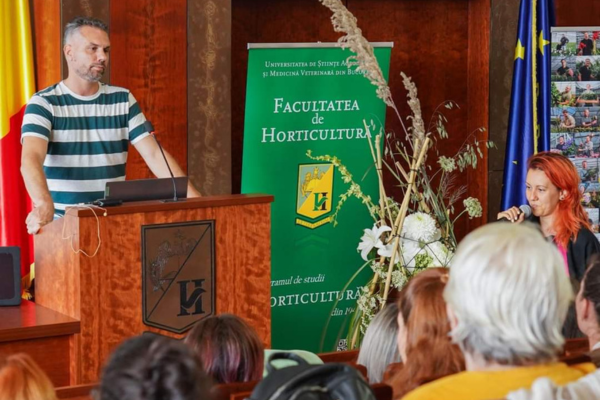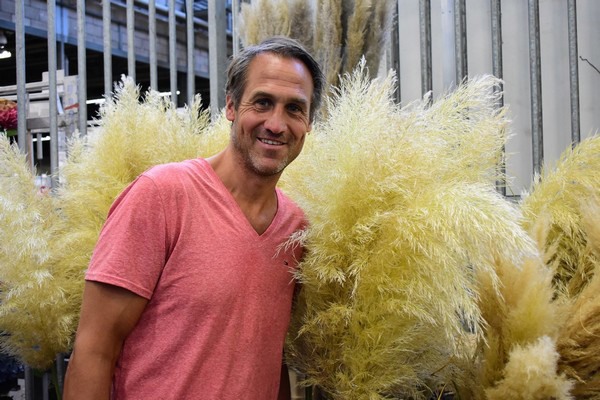It is now the talk of the day. How dangerous is a bouquet? Are flowers really good for the environment? And what about toxins? Should we stop giving bouquets of flowers? The Dutch municipalities of Zutphen, Amersfoort and The Hague think so and are largely doing away with the bunch of flowers. We spoke to Jan Huisman of De Vakbloemist, Mike Duivenvoorden of Duif Flowers and Ronald van Norde of Agora about the impact on the sector.
"The sentiment is painful, you can see that florists are suffering," Jan Huisman of De Vakbloemist tells us. In the Netherlands alone, some 5,500 florists are members of the platform. "It fits in the zeitgeist in which everything is under scrutiny, now the floriculture sector has to show what it is worth."

Jan Huisman
Ignorance
Recently, it came out that a young girl died in France from the effects of pesticides that her mother came into contact with years ago while working in a florist shop. According to Jan, this did cause a lot of negative attention to florists. "We are proud ambassadors of the floriculture sector and see it as our duty to start the conversation. The discussion on pesticides quickly threatens to get bogged down in a yes-no game, but the truth lies somewhere in the middle. After all, flowers bring joy and have the power to express emotions. Transparency is essential here, and there are already good initiatives like MPS and green florist labels. We are currently in talks with the industry to find ways to further increase this transparency. We need to start the conversation right now, especially with municipalities and other parties who are critical of this. Let's show them what growers are already doing, and thus eliminate ignorance."
New opportunities
Jan continues: "Everyone around me talks about how happy flowers make them, and this is also supported by research. Let's build a better, transparent future together. Openness should be the norm. Perhaps it is time to work with breeders to look at varieties that are naturally more resistant, without focusing only on cosmetic properties. Here lies an opportunity for Dutch floriculture to lead the world and distinguish ourselves by focusing on sustainability."
"As a platform, we play a crucial role in communicating that transparency, together with florists," he adds. "Perhaps this is precisely the time to exploit new opportunities, such as offering organic flowers and responding to changing consumer demands. People still want flowers; let's make sure they can make sustainable and responsible choices."
Unbalanced
"Anything nice they want to take away," thinks Mike Duivenvoorden of Duif Flowers. "Flowers are an essential part of our daily lives, from cultural traditions to personal expression. Banning them would not only have a huge impact on the flower industry, but also on all people who use flowers to bring joy, beauty, and emotion into their lives. It seems to me that the ban is an unbalanced measure that does not take into account the positive effects of flowers on our well-being and economy. Instead of a ban, we should strive for sustainable solutions that benefit both nature and the flower industry. Sustainability is important, but that doesn't mean that the whole industry should be destroyed.I find it especially sad for the flower shops that are in those municipalities."

Mike Duivenvoorden
A phase
Ronald van Norde of Agora sees the criticism of the flower industry as a phase. "You hear a lot of things lately that are not good. Just yesterday I saw a video that salmon is not good either, and as a little boy I was sitting at my grandparents' table when it was suddenly announced that milk would not be good. Things like that always keep coming up and now it's flowers' turn for once. Many people have all kinds of things to say about it, which doesn't do much good for our trade. There is of course a small advance in organic flowers, but that will never be able to completely take over the market, because cultivation is difficult. Flowers will always exist and a group of people won't just stop that, but it certainly damages our market. Yet, I think it's just a phase."
For more information:
Jan Huisman 
The Trade Florist
Tel: +31 (0)6 42050257
[email protected]
www.devakbloemist.nl
Mike Duivenvoorden
Duif Flowers
Tel: +31 (0)6 19 378 869
[email protected]
www.duifflowers.com

Ronald van Norde
Agora Group
[email protected]
www.agoragroup.com
Index photo: ID 110870933 © Ruud Glasbergen | Dreamstime.com
